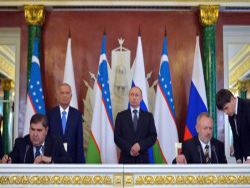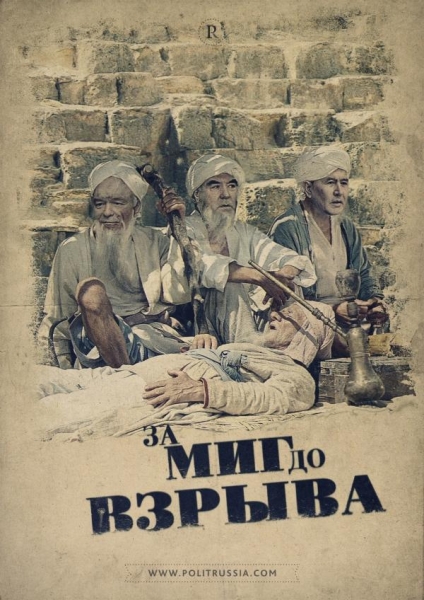
Given that the Uzbek authorities had not made any official statements about the health of Karimov, and taking into account the fact that he is 78 years old, not surprising that many are talking about how will Uzbekistan after Karimov.
And Central Asia talks about the approaching change of regime is applicable not only to Uzbekistan.
Since 1991 the President of Kazakhstan is Nursultan Nazarbayev, who is now 76 years old. Since 1994, the reigns of Tajikistan Emomali Rahmon. However, it is noticeably younger – through the month he turned 64.
How legitimate is it to assume that after the departure of those permanent and rigid rulers come to power, their successors, and if they have it? Will change the Central Asian regimes to be accompanied by a surge of Islamism? What to expect and what to fear in the near future to the region and the world at large?
Host of “the Fifth floor” Sergey Zakina discussed these issues with political scientist, expert on Central Asia Arkady by Dubrovin and orientalist, a specialist on Islam and the Islamization of the Moscow Carnegie center Alexei Malashenko.
Sergey Zakina: Islam Karimov has been in power in Uzbekistan, more than a quarter of a century. Karimov came to power in the Soviet era, Prime Minister at the time was Margaret Thatcher. It was a completely different world. How much of this time has changed in Uzbekistan?
Arkady Dubnov: Fidel Castro has been in power for half a century, in the United States during this time, there have been 11 presidents. In Uzbekistan could create a sustainable tourist complex in part, in Samarkand, for example.
Islam Karimov – a kind, unlike anyone else, the leader of the post-Soviet space with outstanding charisma, which the authorities kept an incredible ambition and a huge number of complexes.
He was sure that he could make the country a great state. Great future never came, but he was able to provide some stability, which does not depend on external influences, however, smaller than in Turkmenistan or North Korea.
That era has ended, and further coated with unpredictable consequences, which can be dangerous for the situation throughout Central Asia.
I hope that now in Uzbekistan attempts to reach consensus between the elites that agree on the succession. Otherwise, take advantage of the situation, some forces, including in Uzbekistan.
S. Z.: International human rights organizations believe Karimov, one of the most brutal dictators of our time. The bloodiest tragedy is considered the dispersal of a demonstration in Andijan in may 2005, when thousands of people took to the Central square with the requirements of improving living conditions, provision of civil liberties, the crowd was surrounded by troops, the soldiers opened fire.
Even according to official figures killed nearly 190 people. Karimov claimed that the Andijan was an attempt of the Islamist uprising. How strong now the danger of the Islamization of Uzbekistan?
Alexei Malashenko: I don’t know. The situation is unpredictable. But the activity of the Islamists will not have the original.
If the elites agree, and this is probably because the negotiations are long: this is not the first coma Karimov. In Uzbekistan people are very intelligent. If they do not agree, the Islamic factor will play its role.
For example, the weakest clan can apply to Islam as a political weapon, as it is done everywhere. They can appeal to the Islamic opposition, which is there, despite the efforts of the Karimov to get rid of them.
While it was not a very serious force. In Uzbekistan two factions: the Islamic movement of Uzbekistan, which is sometimes called the Islamic movement of Turkestan or something, which while based in Afghanistan, but can come back quickly; and the organization Hizb-ut-Tahrir, which many say but few understand it.
Many thousands of its members went to Russia, many are in prison, but the popularity of they do not possess. But they will be a major factor, if not smooth transition of power.
S. Z.: well-Known Amnesty International report on torture suffered by the prisoners in the Uzbek prisons. It reminds of the story about the rule of Saddam Hussein, Gaddafi and other dictators after the fall which contributed to the Islamization of these countries. Is such a scenario possible in Central Asia?
A. D.: Cruelty to enemies in the modern world is quite widespread. Can remember flying prisons in which the Americans kept the accused in the attack on the twin towers, Guantanamo Bay, Cuba.
And urbanized Uzbek population perceives Karimov as a guarantor of security because it protects them from Islamic extremism.
Uzbekistan, on the transparency of the processes taking place there, is located between Turkmenistan and Kazakhstan. And the Chancellor of Germany receives the President of Turkmenistan, where the fate of hundreds of thousands of prisoners unknown to anyone, they do not admit anyone. That’s because Turkmenistan has gas, has resources that Europe can use.
The world is cynical, it is not necessary to allocate Karimov, who created a cruel and rigid system, as a tyrant, which is very different from the others. I then asked someone from the West, will Uzbekistan in a democratic way now. Amazing primitive – democratic way is necessarily good. We have to be realistic.
S. Z.: speaking of the President of Turkmenistan, Berdimuhamedov, the current changed Turkmenbashi, Niyazov, who was also the undisputed ruler. Karimov has been in power for a long time, although the Uzbek Constitution does not allow to be in power to the President more than two terms. But Karimov has appointed a referendum, his term in power was calculated with their account. Anyone else in Central Asia does that?
Am: everybody’s doing it. The West has to rethink the situation in the Muslim world. It is quite clear that the alternative to authoritarian regime – no. Civil society, democracy no.
Was the Arab spring. Many were talking about democracy! And the experts say – there is Islam. What have we got? The father of the nation in Egypt, which, if you do not cope with the situation, again, give power to Islam and everything will go in a circle.
Karimov is not a fiend. Uzbekistan – the former Soviet Islamic state. What you want it to be like Sweden? There is much to criticize, but we don’t criticize a tree for a tree?
But no matter who came after Islam Karimov, the first short period, he will undertake liberalization, or it is somehow possible to call. Any regime needs money, technology, interaction, not only with China but also with the West, and Uzbekistan will have to show their “openness”.
Even in Turkmenistan, when he came Berdimuhamedov, speaking about the “new”, although it is kind of old. And then it all went in a circle.
The new authoritarian regime may be stricter or looser, but can you imagine in Uzbekistan real multi-party regime? And if that will happen, it will not be a modern political competition, and the regional-clan competition that will not bring anything good.
These countries need to live, work and interact as they are.
S. Z.: I remember Karimov, Nazarbayev in Kazakhstan. They are almost the same age. But both politically and economically Kazakhstan is a more prosperous country. Does this mean that regime change there will be more prosperous?
A. D.: No. In Uzbekistan we don’t know anything about the scenarios of the outbreak of transit in Kazakhstan many years, there are the working scenarios of transit. The successor appointed by Kassym-Jomart Tokayev, then there was a rumor that the successor will be the current Prime Minister. Then came the daughter Dariga.
That is constantly discussed. But when that happens, everyone will be confused and will not be available. And the clash of elites will be much steeper.
In Uzbekistan the elite is much more responsible. There are no oligarchs, and in Kazakhstan. And they, like Russia, have no limits of greed and their desires.
S. Z.: So can the change of regimes in Central Asia can be dangerous for the rest of the world?
A. M.: Probably not. In comparison with other regions, Central Asia and the periphery. State is different.
What is common between Turkmenistan and Tajikistan? But these changes affect all areas, and that will occur in Uzbekistan, a major impact on Tajiks and Kyrgyz. I do not know whether the Kazakhs, but it’s also likely.








